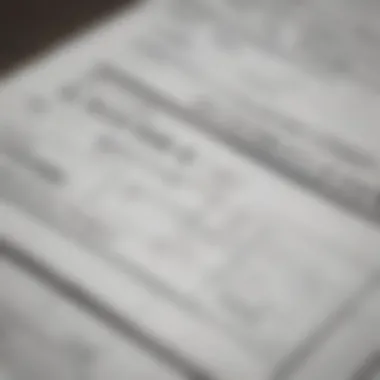Understanding Cashier's Checks: A Comprehensive Guide


Intro
In today’s financial world, cashier's checks hold a unique place. They are often seen as a bridge between the informal checks people write to one another and the more formal methods of payment like wire transfers or electronic payments. Understanding cashier's checks can be crucial, especially for investors, financial advisors, and analysts who regularly navigate the complexities of various financial transactions.
A cashier's check is essentially a check guaranteed by a bank, drawing on the bank’s own funds rather than an individual’s account. This makes them a safer option for significant transactions where risk needs to be minimized. Particularly in real estate deals or vehicle purchases, these checks provide a layer of trust between buyers and sellers. But what does it take to procure one? What are the costs involved? Understanding these aspects is pivotal in making informed financial decisions.
Cashier's checks are not only about the mechanism of payment but also about the regulations and costs associated with them. With institutions like banks and credit unions offering them, the process can sometimes feel daunting. However, grasping the nuances surrounding these checks equips individuals and businesses with the knowledge needed to navigate their financial landscape more effectively.
As we delve deeper into the intricacies of cashier's checks, we’ll explore:
- The defining characteristics that set cashier's checks apart from other payment options.
- Locations where these checks can be acquired and any steps involved in the procurement process.
- The financial implications, such as fees and regulations, that govern the use of cashier's checks.
- Considerations for both individuals and businesses, ensuring that each reader walks away with a clear understanding of the subject.
Through this examination, we aim to untangle the often-misunderstood world of cashier's checks, allowing investors and advisors to grasp their significance, practicality, and the underlying financial certainty they can provide.
Understanding Cashier's Checks
Cashier's checks play a pivotal role in the financial world, serving as a reliable means of payment for various transactions. They are particularly valued for their security and guarantee of funds, making them often favored in high-stakes situations such as real estate deals or large purchases. This segment highlights key insights into cashier's checks, focusing on their definition, operational mechanics, and how they stack up against other popular payment methods.
Defining Cashier's Checks
A cashier's check is a type of check that is drawn by a bank on its own funds. Unlike personal checks, which rely on the account holder's balance, a cashier's check is prepaid and represents a secure means of payment. The bank guarantees that it has the necessary funds available and assures the recipient that the check will clear, reducing the risk of fraud or default.
Where to Obtain Cashier's Checks
Finding the right place to obtain cashier's checks is a vital part of the process. Knowing where to go can save time and often money, not to mention giving peace of mind about the transaction. Cashier's checks are commonly needed for real estate purchases, car sales, or any situation where reliable funds are required. Therefore, understanding the options available can help both individuals and businesses make informed decisions.
Banks
Local Banks
Local banks often stand as the front line in the battle of trust and accessibility. One key characteristic of local banks is their personal touch; customers often build relationships with tellers or even the bank manager. This local knowledge typically extends to services, including cashier's checks.
Here are some advantages of obtaining a cashier’s check from a local bank:
- Personalized Service: You can ask questions or clarify doubts directly with a face-to-face conversation.
- Community Connections: Local banks might have specific insights about the community and local regulations with implications for your transaction.
However, they might not have the same resources as larger banks, like extended hours or multiple locations, which could be a hiccup for some. So, while local banks may cultivate loyalty with their personalized service, it might come at the cost of convenience.
National Banks
National banks represent a different breed. These institutions are often associated with stability and broad reach. With branches all over and the capability to produce cashier's checks on demand, they cater to both local and non-local customers.
The major benefits include:
- Availability: Most national banks operate longer hours and have numerous branches. This accessibility can prove invaluable in urgent situations.
- Streamlined Transactions: They tend to have standardized processes that can make obtaining a cashier's check quick and straightforward.
However, it’s important to mention the downside; with the scale and size of national banks, customers may feel more like a number rather than an individual, potentially lacking in personalized service often found in local banks.
Credit Unions
Credit unions can serve as an alternative, often providing an appealing combination of local touch along with the operational efficiency of a larger institution. They usually have lower fees and may offer more competitive rates when it comes to cashier's checks. However, membership is often required, which might limit access for some individuals.
Advantages include:
- Lower Fees: Credit unions tend to charge less for the same services compared to banks.
- Member Focused: With a cooperative model, credit unions prioritize their members' needs and offer benefits accordingly.
The downside could be the limited number of branches or ATMs compared to nationwide banks. Each local credit union might not have the availability that their larger counterparts boast.
Online Financial Services
Digital Banks
In today's tech-savvy world, digital banks are emerging as a viable option for obtaining cashier's checks. These banks operate online without physical branches, often translating into lower fees and higher interest rates on accounts.


One major perk of digital banks is:
- Cost-Effectiveness: Fees associated with obtaining a cashier's check can be significantly lower, appealing to budget-conscious individuals and businesses.
However, one unique feature is that online verification might take longer than face-to-face interactions. This lag could create additional delays when time is of the essence.
Third-Party Services
Third-party services, such as platforms geared towards check issuance, offer yet another avenue. While they provide an easy process for obtaining a cashier's check, ensuring their legitimacy is critical. They often incorporate user-friendly interfaces and can operate for both individuals and businesses with minimal fuss.
Advantages can include:
- Convenience: Quick access from a computer or smartphone without the need to visit a bank.
- Fast Processing: Often they will complete transactions at lightning speed.
On the flip side, their reliability is often questioned. Consumers must do their homework to avoid potential scams or issues regarding authenticity.
Retail Outlets
Post Offices
Post offices, while sometimes overlooked, can also issue cashier's checks. Often, they offer services similar to those of banks but usually at lower costs. For those not needing a check regularly, going to the post office may be logical.
- Accessibility: Most communities have a post office nearby, making it simple to get a cashier's check as long as you meet the requirements.
Nevertheless, the unique service often includes limited availability regarding amounts and check sizes, which might pose a problem for high-value transactions.
Check-Cashing Stores
Check-cashing stores fill a unique niche in the financial landscape. These venues cater to individuals needing immediate access to funds. They issue cashier's checks but typically charge higher fees.
Key characteristics include:
- Instant Access: If you need a check quickly, these stores can often cater to you right there and then.
However, one significant drawback is their higher fees and possibly questionable reputations compared to traditional financial institutions.
Choosing the right place to obtain a cashier's check can make a world of difference. Each option bears its own strengths and weaknesses, serving diverse needs that depend on individual circumstances.
Cost Considerations
Understanding the cost considerations of cashier's checks is crucial for anyone involved in financial transactions, whether it be individuals making personal purchases or businesses conducting operations. These costs often reflect the underlying value and security that cashier's checks offer, as they are considered safer than personal checks. When one grasps the various costs associated with cashier's checks, they can make informed decisions that align with their financial needs. This section will explore the typical fees for cashier's checks and the factors influencing those costs, aiding readers in understanding what to expect when acquiring these financial instruments.
Typical Fees for Cashier's Checks
Fees for cashier's checks aren’t set in stone, but they usually range from around $5 to $15 at banks. Some financial institutions may waive these fees for account holders, incentivizing members to use their services. The idea behind these fees is multifaceted; it covers the administrative work, security features, and the peace of mind that comes with a guaranteed payment method.
While such fees may seem trivial compared to the total amount of the check, they can still add up, particularly for businesses or individuals who use cashier's checks frequently. A small business might need cashier's checks often for paying suppliers or vendors, and the costs can stack up quickly. Understanding these fees helps in budgeting accordingly.
"A better grasp of what you're paying for can lead to smarter financial decisions in the long run."
Factors Influencing Costs
Bank Policies
Bank policies play a major role in determining the cost of cashier's checks. Each institution may have its unique pricing structures that reflect their operational costs and customer management strategies. For example, a large national bank might charge more due to their overhead compared to a local credit union that aims to keep their services affordable to attract more members. Additionally, some banks may offer discounts or waive fees for certain accounts, such as those maintaining a minimum balance.
These policies entirely shape the accessibility of cashier's checks. A beneficial characteristic of local banks is that they often prioritize customer relationships, which can lead to a better deal for regular clients. However, this can come with unique disadvantages too; smaller banks may be more limited in terms of service hours and availability of cashiers, thus affecting customer experience.
Amount of the Check
The amount involved in the cashier's check significantly impacts its cost. Higher value checks often come with more stringent verification processes and security measures, which can lead to higher fees. The logic follows that if a bank is liable for a larger sum, it necessitates more rigorous safeguards, thus increasing costs.
Additionally, when issuing larger amounts, individuals might find themselves subject to extra precautionary measures, like requiring extra identification or even limiting the total number of checks that can be issued at a time. On the flip side, these measures contribute to the overall safety of the transaction. Cashier's checks are often sought after for large transactions due to their reliability, but understanding their tiered costs is essential for proper financial planning.


In sum, both traditional and operational nuances surrounding cashier's checks affect their accessibility and price points. With adequate awareness, investors and businesses alike can traverse this financial landscape more effectively.
Regulatory and Security Aspects
When discussing cashier's checks, regulatory and security aspects are crucial to understanding their reliability and safety. This section aims to shed light on the legal protections against misuse and fraudulent activities, which can ultimately impact consumer trust and the smooth operation of financial transactions. Cashier's checks, being a commonly used instrument, require robust measures to protect all parties involved from potential risks, especially in a world where financial scams seem to morph daily.
Understanding Legal Protections
Cashier's checks come with a set of legal protections that offer peace of mind to both buyers and recipients. These checks are issued by a bank, which guarantees payment, unlike personal checks that depend on an individual's account balance. If a bank is involved, consumers are automatically afforded some level of security. If one encounters issues, such as a non-payment situation or a notice of fraud, they can often leverage bank policies regarding fraud prevention.
The role of the Uniform Commercial Code (UCC) is also significant here. It provides a legal framework governing financial transactions involving negotiable instruments like cashier's checks. By understanding these laws, individuals and businesses can navigate disputes more effectively, knowing their rights are backed by legislation. Common protections include the right to recover funds in case of fraud and the potential for insurance through certain financial products. This legal backing can make cashier's checks appear more appealing compared to other payment methods when security is a priority.
Preventing Fraud and Scams
In the world of cashier's checks, knowledge is power. Being informed about how to prevent fraud and scams is vital. Here, we will explore some commonly encountered situations that can lead to deception and what to look out for.
Signs of a Scam
One of the first signs that trouble may be brewing is unsolicited offers that involve cashier's checks. For example, receiving a check via mail without having initiated any contact is a big red flag. Scammers often use forged checks to trick people into sending money before the bank process the check and finds it to be fake. Look for signs such as misspellings, incorrect logos, or inconsistencies in the check details, as these may indicate a scam at play. The old saying holds true: "If it sounds too good to be true, it likely is."
Identifying these scam signs is essential and can save individuals from financial ruin. By enhancing public awareness about fraudulent schemes, the article contributes to an informed reader base capable of identifying and reporting suspicious activities, thus fostering a safer financial environment.
Verification Processes
Verification processes are the backbone of securing cashier's checks against fraud. Institutions typically engage in a range of verification methods before issuing a cashier's check. This includes confirming the buyer's identity and examining the source of the funds. Banks may also recommend that end-recipients should confirm the check’s authenticity via direct contact with the issuing bank rather than relying solely on the details printed on the check itself.
Moreover, technology plays a pivotal role in verifying checks. Digital platforms often incorporate advanced security features that are harder for fraudsters to replicate, like embedded watermarks and unique barcodes. This adds a layer of protection which, while not foolproof, can deter many scammers from attempting to create counterfeit checks. Institutional awareness around these processes enhances customer reliability in cashier's checks as safe financial instruments, promoting their use further.
"Knowledge of protection measures is one of your best defenses against fraud."
How to Get a Cashier's Check
Obtaining a cashier's check is often a critical process, especially for those who are navigating large financial transactions. Unlike a personal check, where the funds depend on your available balance, a cashier's check is backed by the bank's funds, giving it a level of trust and security. This reliability makes cashier's checks suitable for real estate transactions, car purchases, and other situations where guarantees mean everything. Furthermore, understanding how to get one can save you from unnecessary hassles and ensure smooth dealings.
Step-by-Step Process
Choosing the Right Institution
Choosing where to get your cashier's check can be as crucial as what you intend to do with it. Not all institutions are created equal, and the right one can significantly smoothen the process. Local banks often offer personalized service while national banks may have more robust security features.
Key characteristic: Each option brings different advantages. Local banks commonly provide a welcoming atmosphere and quicker service. National banks, on the other hand, often ensure advanced fraud protection measures.
Unique feature: Accessibility is a defining trait. If you're situated in a bigger city, a national bank might be easily accessible, while rural residents may lean towards a local credit union. However, local banks could have restrictions on the amount they can issue in cashier's checks, which could be a drawback for larger transactions.
Providing Necessary Information
When it comes to issuing a cashier's check, providing accurate information is non-negotiable. This includes details like the payee's name and amount required. Getting this right is crucial to avoid any issues later on. It's also essential for thwarting potential fraud attempts.
Key characteristic: The accuracy of details protects you and the bank. An incorrectly spelled name or wrong amount could lead to delays or even rejection at the time of cashing.
Unique feature: Detailed records of this information are typically retained by the bank. This acts as a protective measure and also offers peace of mind should any disputes arise.
Payment Methods
Payment methods for obtaining a cashier's check can vary quite a bit. Most institutions allow you to pay via cash, debit card or, in some cases, a credit card. Choosing the right one can influence both your experience and the costs involved.
Key characteristic: Cash payments typically allow for immediate issuance, while debit transactions might take a bit longer, as they require electronic processing.
Unique feature: Some banks might charge additional fees for using a credit card for this purpose, depending on their policies. Being aware of these factors enables you to choose the best method that aligns with your needs and reduces extra charges.
Required Documentation
Identification


When applying for a cashier's check, presenting a valid identification is a must. This is not just a formality; it’s a vital layer of security designed to protect both you and the institution. The type of ID accepted can vary, but generally includes government-issued IDs like passports or driver's licenses.
Key characteristic: Having up-to-date identification not only speeds up the process but also ensures legal compliance with banking regulations.
Unique feature: Beyond proving your identity, bringing the correct ID can often facilitate larger transactions, as it establishes trust with the bank from the outset.
Account Number
Finally, you will also need your account number. This is not merely a technicality; it serves a practical purpose. The account number is linked to your funds, ensuring that the cashier's check can be properly funded through available resources.
Key characteristic: By providing your account number, the institution can quickly verify your standing and expedite the transaction.
Unique feature: Some institutions might have specific stipulations on how much you can withdraw or get in a cashier's check, depending on your account type, which is why verifying this before going in can be useful.
Remember: Having the correct documents on hand can save you from frustration and streamline the process of obtaining your cashier's check, making the overall experience more efficient.
Considerations for Businesses
When it comes to managing financial transactions, businesses often find themselves weighing various options to ensure security and reliability. Cashier's checks emerge as an important tool in this realm, especially in larger transactions. This section dives into how businesses can benefit from using cashier's checks, alongside the inherent risks that accompany their use.
Using Cashier's Checks for Business Transactions
Cashier's checks are crucial for businesses engaging in large transactions, such as real estate purchases or significant equipment investments. What makes these checks stand out? Reliability and trustworthiness. Since the funds are guaranteed by the bank, recipients can have confidence that they're dealing with a secure form of payment.
Additionally, businesses may prefer cashier's checks for several reasons:
- Immediate accessibility of funds: Once issued, the funds are available without the need for the recipient to wait on funds clearing.
- Less exposure to fraud: As the issuing bank verifies the funds beforehand, it significantly reduces the risk of bounced checks or scams.
- Professionalism: Issuing cashier's checks often reflects a level of seriousness in business practices, promoting trust between parties.
However, businesses should be aware of the costs involved. Many banks charge fees, which can add up, especially for frequent transactions. Still, the benefits generally outweigh the downsides when it comes to securing larger deals.
Managing Risks and Fraud
With every financial tool, there exist risks, and cashier's checks are no exception. Understanding how to manage these risks while harnessing the benefits is crucial for any business.
Business Policies
Developing solid business policies around cashier’s checks is essential. A key characteristic of effective policies is clear protocols for issuing and handling these checks. Employees should be trained to understand when to use them and what security measures need to be in place.
A notable feature of business policies is the establishment of limits or thresholds for cashier's checks. This can prevent employees from issuing checks for amounts that could expose the business to unnecessary risk.
By having strict policies in place, businesses reduce the likelihood of mishandling or fraud, creating a safer transactional environment. However, it's important to strike a balance—not all situations can be easily codified, so having flexible yet firm guidelines is often seen as an advantageous approach.
Training Employees
Training employees about cashier's checks is another linchpin for effective business practices. Understanding the nuances of cashier's checks ensures that team members recognize their importance in larger financial dealings. Hands-on training regarding how to request, verify, and handle these checks adds a layer of security.
Unique features of training programs could include simulations of transactions and scenarios involving potential fraud attempts. This helps employees think on their feet and recognize red flags.
A disadvantage that sometimes arises is the time commitment of training sessions. While the initial investment in time may seem burdensome, the long-term benefits of having knowledgeable staff often outweigh these concerns.
Final Thoughts
As we wrap up our examination of cashier's checks, it's crucial to reflect on their role in modern transactions. They serve as a reliable payment form, especially when trust and security are at a premium. This section delves into the significance of these checks, encouraging readers to weigh their utility against modern payment alternatives.
Evaluating the Use of Cashier's Checks
Cashier's checks are often chosen for their perceived stability and assurance. Unlike personal checks, which can bounce if there are insufficient funds in the account, a cashier's check is drawn directly from the bank's funds. This guarantees that when the check is presented for payment, the funds are available. When managing large transactions, such as a house purchase or a significant business deal, this reliability becomes paramount.
- Security: The reassurance that funds are guaranteed is a considerable advantage.
- Acceptance: Many sellers prefer cashier’s checks, especially in real estate or large asset transactions.
However, the chosen method should be assessed based on the specific transaction needs. Sometimes, other methods like wire transfers might offer equal safety with added convenience, so it’s vital to evaluate what fits best for the situation.
Future Trends in Payment Methods
Looking ahead, it’s evident the landscape of payment methods is shifting. Cashier's checks, while stable, could be edged out by digital innovations. Electronic payments and mobile wallets are gaining traction due to their speed and convenience.
Key shifts to keep an eye on:
- Digital Wallets: Services like PayPal and Venmo are erasing the need for traditional checks.
- Blockchain Technology: This may offer secure transaction methods with verifiable records.
- Contactless Payments: Increasingly common in retail, these methods present an attractive alternative to both cash and checks.
As financial technology evolves, those who rely on cashier’s checks must stay informed. Understanding these emerging trends will ensure that both individuals and businesses maximize their transaction security while adapting to changing preferences.







